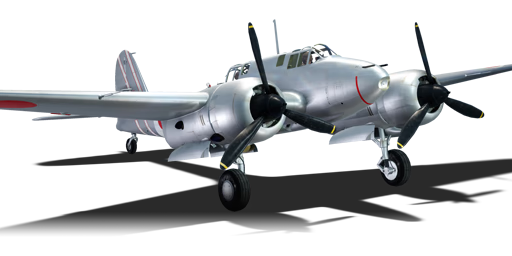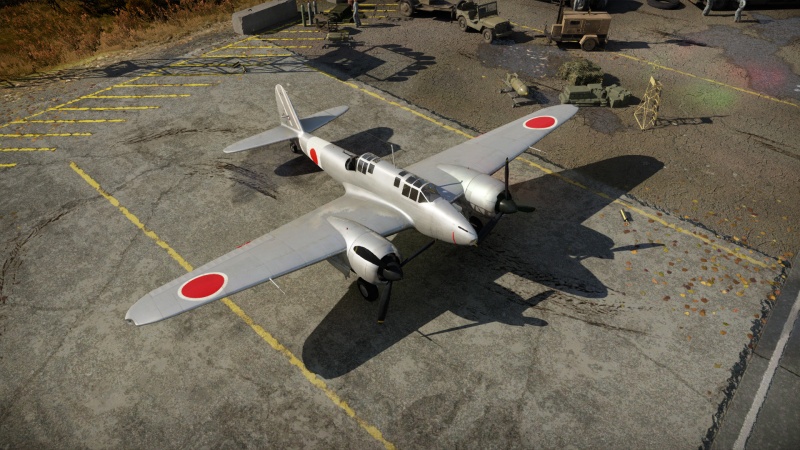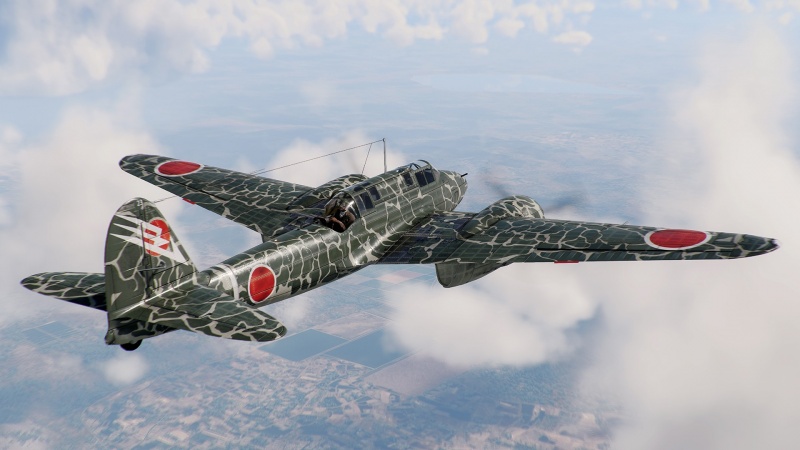Ki-45 ko
| This page is about the Japanese twin-engine fighter Ki-45 ko. For other versions, see Ki-45 (Family). |
Contents
Description
The Ki-45 ko Toryu is a rank Japanese twin-engine fighter with a battle rating of (AB), (RB), and (SB). It was introduced in Update 1.31.
Being classed as a heavy fighter, the Ki-45 isn't the best in the manoeuvrability category. However, for a heavy fighter, it manoeuvres very well. It is even capable of out-turning aircraft such as the P-47D-25. Unlike heavy fighters of other nations, the Ki-45 series does not feature aircraft with large amounts of heavy weaponry. This is a major downside, considering how heavy fighters traditionally give up manoeuvrability and speed for armament. Instead, the Ki-45 utilises more of an equilibrium between manoeuvrability, speed, and armament. These are what makes the Ki-45 both a capable dogfighter and bomber hunter.
The first variant of the Ki-45, the Ki-45 ko, features the least "hard-hitting" armament of the series. Wielding two Ho-103 12.7 mm machine guns and one Ho-3 20 mm cannon, this aircraft is the best suited for dogfighting as it has the largest total ammunition pool out of all the Toryus. Sitting at rank I, this beast is more than capable of shooting down anything it may face.
The Ki-45 also has a very good turn rate, unlike other heavy fighters. Although the aircraft itself is large and presents an "easy target" in many players' minds, the Ki-45 is rather nimble. Use this to your advantage when engaging enemy aircraft. Unfortunately, the Ki-45 is a heavy fighter, meaning its turn time is still not on par with other aircraft such as the F2A-3. In certain cases, the Ki-45 pilot may have to rely on their tail gunner to get the job done. The "ko" version of the Ki-45 features a 7.92 mm Type 98 machine gun with 1,050 rounds. Although lacklustre, with shot placement it is possible to destroy enemies on the aircraft's tail. Aim for the pilot or the engine, as those are generally the weakest points on most aircraft. If the tailing enemy is a biplane, aim for the wings since they are very fragile.
The Toryu is also rather fragile for a heavy fighter. Although it does feature two engines, the Ki-45 does not have very much armour protection. Only the back of the pilot's seat has armour, leaving both the gunner and engines unprotected. This can prove costly in a fight. If one does find themselves tailed, call upon teammates for assistance.
General info
Flight performance
| Characteristics | Max Speed (km/h at 6,300 m) |
Max altitude (metres) |
Turn time (seconds) |
Rate of climb (metres/second) |
Take-off run (metres) | |||
|---|---|---|---|---|---|---|---|---|
| AB | RB | AB | RB | AB | RB | |||
| Stock | 551 | 533 | 24.9 | 25.5 | 16.4 | 16.4 | 520 | |
| Upgraded | 593 | 570 | 23.2 | 24.0 | 23.1 | 19.5 | ||
Details
| Features | ||||
|---|---|---|---|---|
| Combat flaps | Take-off flaps | Landing flaps | Air brakes | Arrestor gear |
| ✓ | ✓ | ✓ | X | X |
| Limits | ||||||
|---|---|---|---|---|---|---|
| Wings (km/h) | Gear (km/h) | Flaps (km/h) | Max Static G | |||
| Combat | Take-off | Landing | + | - | ||
| 450 | 444 | 308 | ~11 | ~7 | ||
| Optimal velocities (km/h) | |||
|---|---|---|---|
| Ailerons | Rudder | Elevators | Radiator |
| < 360 | < 320 | < 450 | > 330 |
Survivability and armour
- 16 mm Steel plates behind the pilot.
Modifications and economy
Instead of focusing on armament like other heavy fighters, the Ki-45 is more balanced between armament and flight performance. While the default ammunition belts for both weapons on the Ki-45 ko are workable, it can help to upgrade. Unlocking the flight performance modules will help drastically in dogfights and turn fights.
Armaments
Offensive armament
The Ki-45 ko is armed with:
- 1 x 20 mm Ho-3 cannon, belly-mounted (100 rpg)
- 2 x 12.7 mm Ho-103 machine guns, nose-mounted (350 rpg = 700 total)
Defensive armament
The Ki-45 ko is defended by:
- 1 x 7.92 mm Type 98 machine gun, dorsal turret (1,050 rpg)
Usage in battles
The Ki-45 ko's armament is much more suited for dogfighting than its later, 37 mm cannon-armed variants. With a moderate ammunition pool, it is easily possible to destroy multiple enemies with this aircraft. It is recommended to use the 20 mm cannon only when the pilot is confident of hitting the enemy aircraft, as it only holds 100 shells. The 12.7 mm machine guns are where most of the damage will be done at range.
In Simulator, the Ki-45 has a decent frontal view with large pieces of glass in front, on top and to the sides, ensuring great visibility. The gunsight has enough room under, allowing easy tracking and leading of targets. However the side views are terrible as the wings & engines block out most of the view downwards, and a thick frame blocks out the upper area, as a result the common way of circling above an area to spot something is extremely limited. Rear visibility is almost non existent with the entire tail obstructed by the headset.
Manual Engine Control
| MEC elements | ||||||
|---|---|---|---|---|---|---|
| Mixer | Pitch | Radiator | Supercharger | Turbocharger | ||
| Oil | Water | Type | ||||
| Controllable | Controllable Not auto controlled |
Controllable Auto control available |
Controllable Auto control available |
Separate | Controllable 2 gears |
Not controllable |
Pros and cons
Pros:
- 7.92 mm tail gun
- Fairly good speed
- 16.5 mm of armour in pilot's seat
- Good manoeuvrability
- Two engine design
- Effective armament
- Very good climb rate
Cons:
- Beat in turn fights by some aircraft
- Prone to fuel and engine fires
- Locks up at high speeds
- Mediocre roll rate, gets worse as speed increases (compression)
- Limited ammunition for all weapons
- Lack of protection around fuel tanks, engines, and gunner
History
Initially designed to be a bomber escort, the Ki-45 was first deployed in what is now China and Vietnam. It was found to be easily outclassed by P-40s piloted by the Flying Tigers. As a result, the Ki-45's role was changed to anti-shipping and ground attack, where it performed satisfactorily. Nonetheless, the Ki-45's greatest strength proved to be its bomber intercepting capabilities. Heavily armed with 37 mm cannon, the Toryu (Dragon Slayer) could destroy heavy bombers with ease. As the war progressed, the need for an interceptor to defend the Japanese mainland was ever present. Soon, the Ki-45 was deployed to counter B-29 Superfortress raids. Although its armament was clearly deadly enough, the Ki-45 suffered at high altitudes. Pilots soon resorted to ramming attacks against the Superfortress'. Special attack groups specifically designed for this purpose formed, but by late 1945 Imperial Japan's fate had been sealed.
| Archive of the in-game description | |
|---|---|
|
Kawasaki Ki-45 KAI Ko (Model A) Type 2 Toryu (Allied reporting name: Nick) twin-engine army fighter A twin-engine all-metal monoplane fighter with an enclosed two-seat cockpit and a retractable landing gear system including a tail wheel. The development of the Ki-45 fighter started in the design bureau of the Kawasaki Company under the direction of Takeo Doi in January 1938. The aircraft was a further development of the Ki-38 twin-engine fighter, which had been produced by the company for the Japanese Army Air Service since March 1937. It was decided to use two Bristol Mercury air-cooled engines, produced under licence by the Nakajima Company under the designation of Ha-20b. The first prototype fighter was built by early 1939. It got off the ground for the first time in February 1939. The prototype's tests showed that the vehicle's flight characteristics, particularly its speed, were significantly worse than the specification's requirements. Despite improvements, the two other prototypes never reached the specified design speed, either. So further work on the project was stopped, and the construction of six more aircraft was frozen. In April 1940, the Kawasaki Company was ordered to equip the aircraft with more powerful Nakajima Ha-25 fourteen-cylinder, air-cooled engines, with a takeoff power of 1,000 hp. The engines' smaller diameter enabled the installation of NACA cowlings and reduced propeller spinner size. The first flight of the improved Ki-45 took place in July 1940. While the tests were being conducted, Takeo Doi suggested a number of modifications for the aircraft to improve its flight characteristics and controllability and to facilitate its full-scale production. The Ki-45 obtained a thinner fuselage, a new fin, straight wing edges, smaller nacelles, and a reflector sight in place of its telescopic one. The Ki-45's armament consisted of two 12.7 mm Ho-103 (Browning) machine guns, with 350 rounds each, mounted on the forward fuselage, and one 20 mm Ho-3 cannon, with 100 rounds, mounted on the right side of the lower fuselage. One 7.92 mm Type 98 (Rheinmetall-Borsig MG 15) machine gun with 1,050 rounds was located in the rear defensive turret and operated by the radio operator/gunner. The Army Air Service's headquarters approved these modifications in October 1940. The first Ki-45 KAI ("KAI" meaning "improved") was completed in May 1941. After testing three prototypes, the Kawasaki Company began to prepare for full-scale production. The aircraft obtained the official army designation "Improved Type 2 Two-Seat Fighter Model Ko (A) Toryu". | |
Media
- Skins
- Videos
See also
- Related development
External links
Paste links to sources and external resources, such as:
- topic on the official game forum;
- other literature.
| Kawasaki Aircraft Industries (川崎航空機工業株式会社) | |
|---|---|
| Biplane Fighters | Ki-10-I · Ki-10-I C · Ki-10-II · Ki-10-II C |
| Fighters | Ki-61-I ko · Ki-61-I otsu · Ki-61-I hei · Tada's Ki-61-I hei · Ki-61-I tei · Ki-61-II Otsu Kai |
| Ki-100 · Ki-100-II | |
| Interceptors | Ki-45 ko · Ki-45 otsu · Ki-45 hei · Ki-45 tei |
| Ki-96 | |
| Ki-102 otsu | |
| Ki-108 Kai | |
| Bombers | Ki-32 |
| Ki-48-II otsu | |
| Captured | ␗Ki-45 hei/tei · ␗Ki-61-I otsu · ▃Ki-61-Ib |
| See also | Kawasaki Shipyard Co. |
| Japan twin-engine fighters and strike aircraft | |
|---|---|
| Navy | |
| Land-based Fighter | |
| J1N | J1N1 |
| J5N | J5N1 |
| Army | |
| Ki-45 | Ki-45 ko · Ki-45 otsu · Ki-45 hei · Ki-45 tei |
| Ki-83 | Ki-83 |
| Ki-96 | Ki-96 |
| Ki-102 | Ki-102 otsu |
| Ki-108 | Ki-108 Kai |
| Ki-109 | Ki-109 |






